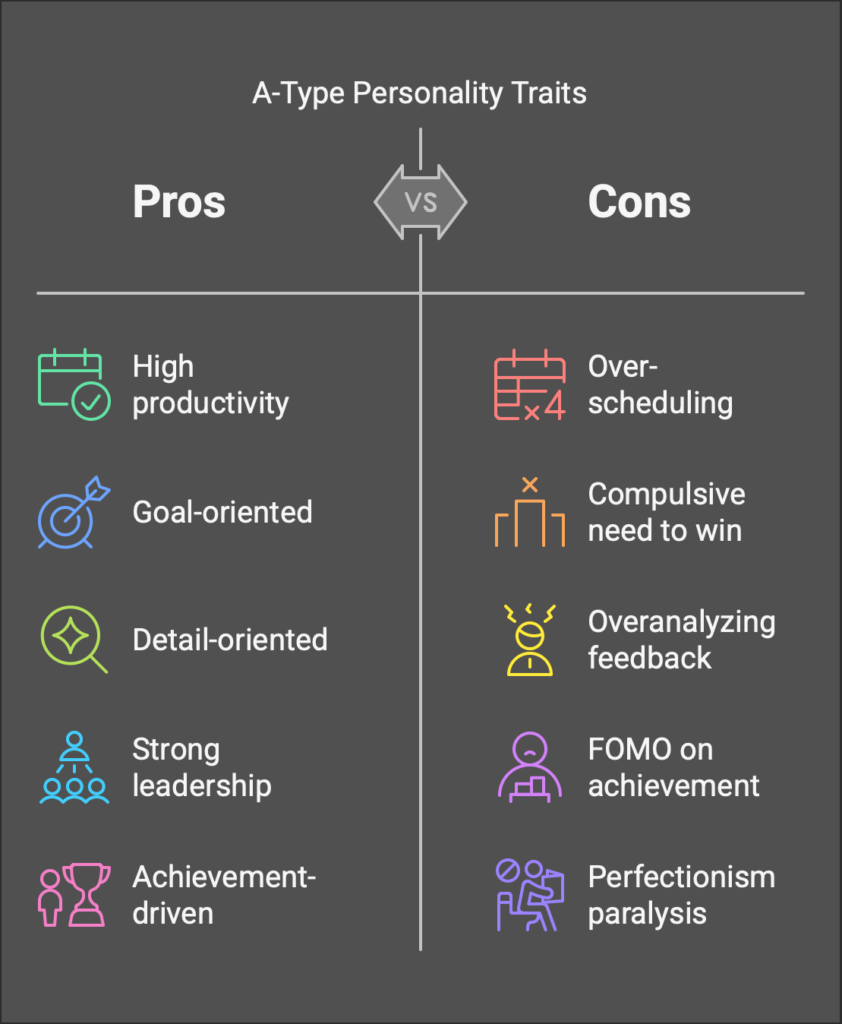This page contains affiliate links. If you purchase a product through one of them, I will receive a commission (at no additional cost to you). I only ever recommend products that I have personally used and loved. Thank you for your support!
If you’ve ever found yourself overloaded with tasks or struggling to find the right way to relax, you’re not alone. Many people, especially those with A-type personalities, feel pressured to excel in everything they do. This post will explore some common traits of A-types and how their B-type counterparts respond to these tendencies. No frills—just an honest look at the everyday dynamics of personality types.
Read also: The Price Of Success 99% Of People Don’t Want To Pay
Read also: Avoid These Common 20s Regrets (16 Tips for a Better Future)
What are A-Type and B-Type Personalities
A-type personalities are typically driven, organized, and competitive. They often feel the need to be productive and can struggle to relax. In contrast, B-type personalities tend to be more laid-back and focus on enjoying the moment rather than achieving specific goals. They provide a much-needed perspective for A-types, reminding them that it’s okay to slow down and take things as they come.
1. Over-Scheduling Everything
– A-Type Problem: Struggling to let go of their meticulously planned calendars, even scheduling “relaxation” time.
– B-Type Reaction: “You planned your downtime? Isn’t the point of relaxing to not plan?”
While scheduling every part of your day allows you to make the most of the time, you can’t prepare for unforeseen events. Sometimes, your schedule will be thrown out of whack, and if you cling too tightly to it, you will only end up frustrated.
Another problem with overscheduling everything is that it leaves little to no time for spontaneity. Life is sweetest when it is balanced (safety/adventure, work/relaxation, healthy food/sweets). Feminine energy especially requires some spontaneity to thrive. So loosen the reigns on your calendar and allow yourself to shift some time blocks according to your mood. The truly urgent things or those you would otherwise procrastinate on can remain a solid fixture in your schedule.
2. Compulsive Need to Win
– A-Type Problem: Turning friendly board games into intense competitions or obsessing over minor achievements.
– B-Type Reaction: “It’s just Monopoly. Nobody cares who wins, except you.”
The need to win doesn’t equate with being a sore loser. A-type personalities can still focus heavily on counting points while being happy for the opponent who beat them. Regardless, not every activity needs to end with a winner. A friendly tennis or bowling match can happen just for the fun of it without actively watching the score.
The more you focus on keeping track of the score, the less you allow yourself to simply enjoy the game. Why not try to win the competition to see who enjoyed the game the most? Spoiler: It’s the person who keeps forgetting the score.
3. Overanalyzing Feedback
– A-Type Problem: Ruminating over a single piece of constructive criticism, even if everything else was positive.
– B-Type Reaction: “Why are you freaking out over that one small comment? It doesn’t matter.”
Feedback is not only meant to provide you with ways to improve. Equally important is to recognize where you did well and celebrate that little victory. If you are an A-type personality, chances are high that there are at least one, if not plenty, positive point within that feedback. Be sure to spend some time thinking and perhaps writing about what you did well after you go out over your ruminating session.
4. FOMO on Achievement
– A-Type Problem: Constantly fearing they’re falling behind in the race to “success” or missing out on opportunities for personal growth.
– B-Type Reaction: “What do you mean falling behind? You’re basically leading the race?!.”
If you put in any effort at all to rack up achievements beyond what is included in the educational/career path of your choice, then you are already ahead of the great majority of the pack. Chances are, as an A-type personality, you are putting in more than a bit of effort, so you can rest assured that you are doing just fine. Nobody can do everything, and it isn’t the quantity but rather the quality of achievements that matter.

5. Turning Everything Into a Productivity Hack
– A-Type Problem: Trying to optimize sleep, grocery shopping, or even hobbies for peak productivity.
– B-Type Reaction: “You made a spreadsheet for Netflix shows? Can’t you just, like, watch them?”
Once you go down the self-help road, it is very easy to lose yourself in a cycle of endless optimization. Of course, there is nothing wrong with optimizing your sleep or your study time. Even if you improve them by 1%, you are bound to make massive gains. The problems come if you try to optimize everything at once and if you expect yourself to run as a well-oiled machine 365 days/year.
You won’t always get 7 hours of sleep with 1 1/2 hours of REM and deep sleep, and that’s fine. If your sleep is great most of the time, you are already doing so well. Seriously, there are countless examples of successful people who make a mess of at least one area of life. Avoiding bad habits is really all you need to do, and optimizing your good habits is going above and beyond. Just don’t forget to actually allow yourself to be human.
6. Always Being “On”
– A-Type Problem: Feeling uncomfortable in moments of idleness, as if every second must be used productively.
– B-Type Reaction: Looking up from their phone screen with a blank gaze, trying to figure out how their five-minute break turned into two hours.
Quiet moments are a part of life. There is no sense in being an overachiever if all your achievements don’t allow you to enjoy the quiet moments that used to be filled with worries about the future. Relax; wasting a few minutes standing in line or waiting at the doctor’s office won’t impact your life in the long run. Of course, you could spend that time more productively, but life isn’t a well-oiled machine. You need to learn how to enjoy its messiness. After all, isn’t that the ultimate flex? Being able to enjoy yourself, no matter what life throws at you?
7. Control Freak Tendencies
– A-Type Problem: Taking charge of group projects (even when not asked) or refusing to delegate tasks.
– B-Type Reaction: “We could’ve just winged it. Why are there PowerPoint slides for game night?”
For A-type personalities, it can be difficult to rely on others for work that needs to be done. They are very aware that many people are not as hard-working and perfectionistic as them, so the idea of having others deliver work that is, in their eyes, subpar is unappealing. You’d probably have to do damage control to appease your perfectionistic tendencies, so why not do it yourself?
Letting go of control and accepting work that doesn’t entirely meet your expectations is a necessary social skill. After all, do you want to be the person who never lets their partner go grocery shopping for them after they forgot one item on the list? Will you refuse to let your kids cook because the result won’t be as tasty as it could have been?
It’s time to release your iron-tight grip and let go of some control.
8. Stress About Relaxing the “Right Way”
– A-Type Problem: Worrying that relaxation or self-care isn’t done properly or effectively.
– B-Type Reaction: “How can you stress about bubble baths? Just take the damn bath!”
A-type personalities tend to see relaxation as a tool for increased productivity. After all, there are many studies showinghow taking breaks is crucial for our performance. So, of course, we should relax the right way, right? Use the Pomodoro timer and all that.
While optimizing your habits is useful (as mentioned above), there is a fine line between optimizing and obsessing. Obsessing is not particularly restful, so be careful of shooting yourself in the leg.
9. Perfectionism Paralysis
– A-Type Problem: Delaying tasks or projects because they’re not “perfect” yet, even if they’re already good enough.
– B-Type Reaction: “Why stress? Nobody expects Picasso every time.”
Attention to detail will set you apart from the great masses. However, done is still better than a perfect work in progress. Allow yourself to hand in work that is great but not perfect. Your next piece of work will already be better than your last, and so on.
The most successful people learn and optimize as they go. But most importantly, they don’t hold back on taking action just because it isn’t ‘perfect’ yet.
10. Hyperfocus on Future Goals
– A-Type Problem: Constantly thinking five steps ahead, unable to enjoy the present moment.
– B-Type Reaction: “You’re planning for retirement? We just started college.”
Having foresight can help you prevent many problems (e.g., gaining a useless degree, entering retirement without the necessary funds, taking up unrealistic loans, etc.). However, as always, a balance is necessary. You don’t want to reach the end of your life and realize you were so busy chasing your goals you never enjoyed your achievements.
11. Having too Many Ideas and too Little Time to pursue them
– A-Type Problem: “I have five brilliant business ideas but I’m way too busy with my current business.”
– B-Type Reaction: “Poor you, because too many business ideas is a problem. As if, I wish I had even one idea!”
While B-type personalities often lament that they’d build a successful business, too, if only they had the right idea. A-types tend to be overwhelmed by all the ideas they have. Ultimately, all they can do is be decisive and consistently pursue one of these ideas until enough time has freed up to chase another. The FOMO is unavoidable; however, juggling many things at once and splitting your attention is only going to drive you into burnout.
In conclusion, we all navigate our pressures and expectations whether you identify more with the A-type drive or the B-type ease. Recognizing these traits in ourselves and others can help create balance. So, take a step back the next time you find yourself stressed about a minor setback or overly focused on a productivity hack. Embrace the imperfections, and remember that sometimes, simply being in the moment is perfectly fine.

